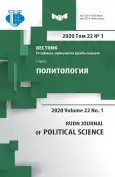The Evolution of Populism in South America: Was J. Bolsonaro’s Victory in the 2018 Brazilian Presidential Election a Precedent or a Model for the Region?
- Авторлар: Ivanov V.G.1
-
Мекемелер:
- Peoples’ Friendship University of Russia (RUDN University)
- Шығарылым: Том 22, № 1 (2020)
- Беттер: 71-80
- Бөлім: RIGHT-WING POPULISM: ORIGINS AND MODERNITY
- URL: https://journal-vniispk.ru/2313-1438/article/view/322147
- DOI: https://doi.org/10.22363/2313-1438-2020-22-1-71-80
- ID: 322147
Дәйексөз келтіру
Толық мәтін
Аннотация
The article analyzes the election campaign, public discourse, and policies of J. Bolsonaro as the President of Brazil. The new President represents the model of an irreconcilable right-wing populist who focuses on US foreign policy. Bolsonaro’s rise to power came amid the crisis of left-wing populism in Brazil. The article raises the question: whether Bolsonaro’s victory is a remarkable case or a new effective model of public policy and political leadership for Brazil and other countries in the region? The author concludes that it depends largely on J. Bolsonaro’s success as the President. At the moment, the interim results of his presidency are highly controversial and continue to divide and polarize Brazilian society.
Негізгі сөздер
Авторлар туралы
Vladimir Ivanov
Peoples’ Friendship University of Russia (RUDN University)
Хат алмасуға жауапты Автор.
Email: ivanov-vg@rudn.ru
Doctor of Political Sciences, Associate Professor of the Department of Comparative Politics
Miklukho-Maklaya Str., 6, Moscow, Russian Federation, 117198Әдебиет тізімі
- Ivanov V.G. Results of Elections in Brazil. International Anticrisis Center. 2018; 12. Available from: http://anticrisis.cc/wp-content/uploads/2018/12/Results-of-election-in-Brazil.pdf. Accessed: 10.02.2019.
- Nunes F., Ranülfo Melo C. Political Parties: The Case of Brazil. The Presidentialization of Political Parties Organizations, Institutions and Leaders. Ed. by G. Passarelli. UK: Palgrave Macmillan; 2015. 300 p. doi: 10.1057/9781137482464.
- Varshavsky A.Y. Institutional Foundations of Intraparty Coalitions in Presidential Systems: Case of Uruguay. RUDN Journal of Political Science. 2019; 21 (4): 673-686. doi: 10.22363/2313-1438-2019-21-4-673-686 (In Russ.).
- Murillo A.T., Murillo D. General Elections 2018 in Brazil: Is Democracy Restored? International Journal of Advanced Research. 2018; 6 (10): 1253-1264. doi: 10.21474/IJAR01/7932.
- Gontijo C., Ramos First L. Caesarism, Populism, and the 2018 Election in Brazil. Capital & Class. 13.11.2019. doi: 10.1177/0309816819884670.
- Mundim P.S., Almeida da Silva G.M. The World Cup and Presidential Popularity in Brazil. A Journal of the Brazilian Political Science Association. 2019; 13 (3): 1-32. DOI: 1981-3821201900030001.
- Kolarov G. Dilma Rousseff and National Consolidation of Brazilians: Problems, Contradictions and Prospects. Political Changes in Latin America. 2015; 1 (17): 28-34 (In Russ.).
- Stavrakakis Y., Katsambekis G., Kioupkiolis A. et al. Populism, Anti-populism and Crisis. Contemporary Political Theory. 2018; 17 (1): 4-27. doi: 10.1057/s41296-017-0142-y.
- Antonov D.E. The Use of Internet Technologies for Mobilizing the Voter Base: Features, Subjects and Prospects. RUDN Journal of Political Science. 2019; 21 (3): 538-548. doi: 10.22363/2313-1438-2019-21-3-538-548 (In Russ.).
- Bacelar da Silva A.J., Robb Larkins E. The Bolsonaro Election, Antiblackness, and Changing Race Relations in Brazil. The Journal of Latin American and Caribbean Anthropology Events. 11.11.2019. doi: 10.1111/jlca.12438.
- Finchelstein F. Jair Bolsonaro’s Model Isn’t Berlusconi. It’s Goebbels. Foreign Policy. 05.10.2018. Available from: https://foreignpolicy.com/2018/10/05/bolsonaros-model-its-goebbels-fascismnazism-brazil-latin-america-populism-argentina-venezuela/. Accessed: 10.02.2019.
- Bruff I. The Rise of Authoritarian Neoliberalism. Rethinking Marxism. 2014; 26 (1): 113-129.
Қосымша файлдар









